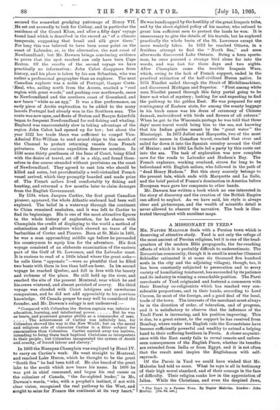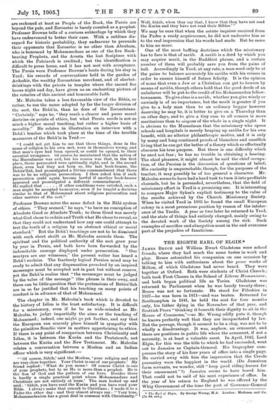Mn. NAPIER MaLcomi deals with a Persian town which is
deserving of attentive study. Yezd is not only the refuge of the most ancient of Persian religions, but it is one of the head- quarters of the modern Babi propaganda, the far-reaching effects of which it is probably difficult to underestimate. The Zoroastrian community, though it is small in number (General Schindler estimated it at some six thousand five hundred souls in the city and the adjoining villages), though, too, it has been constantly subjected to persecution and to every variety of humiliating treatment, has succeeded by its patience and its industry in winning a remarkable position. The Parsi merchants of Yezd originated and fostered a commerce with their Bombay co-religionists which has reached very con- siderable proportions, and in their hands, according to Lord Curzon, lie most of the foreign, and a good deal of the local, trade of the town. The interests of the merchant must always be in the direction of order, of toleration, and of progress, and it is satisfactory to observe that the influence of the Yezdi Parsi is increasing, and his position improving. This is due, to a great extent, to the support he has received from Bombay, where under the English rule the Zoroastrians have become sufficiently powerful and wealthy to extend a helping hand to their suffering brethren in Persia. A closer acquaint- ance with the East rarely fails to reveal remote and unfore- seen consequences of the English Peace, whether its benefits are extended from India or from Egypt, and it is not often that the result need inspire the Englishman with self- reproach.
Of the Parsis in Yezd we could have wished that Mr. Malcolm had told us more. What he says is all in testimony of their high moral standard, and of their courage in the face of difficulty. Their religion ranks low in the appreciation of Islam. While the Christians, and even the despised Jews,
• Five Years in a renialb Town. By Napier Malcolm. London : John Murray. [10s. 6c1. net..1
are reckoned at least as People of the Book, the Parsis are beyond the pale, and Zoroaster is barely counted as a prophet. Professor Browne tells of a curious subterfuge by which they have endeavoured to better their case. With a sublime dis- regard for historic probability, they endeavour to persuade their opponents that Zoroaster is no other than Abraham, who is honoured by Mohammedans as one of the five Book- bearing Prophets, and the Avesta the lost Scripture with which the Patriarch is credited ; but the identification is difficult to press home, and it has not met with acceptance. The Parsis were Professor Browne's hosts during his stay in 'Yezd; his records of conversations held in the garden of Ardashir, the wealthy Zoroastrian merchant, and of sherbet- drinkings with the priests in temples where the sacred fire burns night and day, have given us an enchanting picture of the votaries of this ancient and honourable faith.
Mr. Malcolm takes a less favourable view of the Bitbis, or rather, to use the name adopted by far the larger division of the sect, the Behit'is, than he does of • the Zoroastrians. "Certainly," says be, "they teach a clearer and purer moral doctrine on points of ethics, but what Persia needs is not so Much a higher moral teaching, but rather a higher basis of morality." He relates in illustration an interview with a teacher which took place at the time of the terrible massacres of the BehiCis in Yezd
:- "I could not get him to see that these things, done in the name of religion to his own sect, were in themselves wrong, and that man's eyes had been opened, or could be opened, to their essential wrongness. Of course he maintained that the action of the Mussulmans was evil, but his reason was that, in the first place, those persecuted were spiritually right, and in the second place, even had they not been so, the last book-bearer, the Behau'llah, had promulgated a Divine commandment that there was to be no religious persecution. I then asked him if such persecution could again become lawful if another book-bearer
appeared and promulgated a different commandment
He replied that if other conditions were satisfied, such a
man might be accepted to-morrow, even if he taught a doctrine similar to that of Mohammad about religious persecution and other matters of the sort."
Professor Browne notes the same defect in the Bitbi system of ethics. "They seemed," he says, "to have no conception of Absolute Good or Absolute Truth; to them Good was merely what God chose to ordain and Truth what He chose to reveal, so that they could not understand how any one could attempt to test the truth of a religion by an abstract ethical or moral standard." But the Belliei teachings are not to be dismissed with such short shrift as Mr. Malcolm accords them. The spiritual and the political authority of the sect grow year by year in Persia, and both have been forwarded by the indomitable courage displayed under persecution. "Our martyrs are our witnesses," the present writer has heard a. Behiii exclaim. The fearlessly logical Persian mind may be
ready to admit that any dispensation preached by an inspired .messenger must be accepted not in part but without reserve yet the Behh'is realise that "the messenger must be judged by the value of the message" (the phrase is their own), and
there can be little question that the pretensions of Behau'llah are in so far justified that his teaching on many points of conduct is in advance of that of Mohammed.
The chapter in Mr. Malcolm's book which is devoted to the history of Isrun is the least satisfactory. It is difficult for a missionary, even if he be as wide-minded as Mr. Malcolm, to judge impartially the aims or the teaching of Mohammed ; indeed, one might go yet further, and say that the European can scarcely place himself in sympathy with the primitive Semitic view in matters appertaining to ethics. If them is any point of comparison between Christianity and ham, it is between the Kuriin and the Pentateuch, not between the Miran and the New Testament. Mr. Malcolm relates a conversation between a Moslem and an Indian officer which is very significant :—
" Of course, Sahib,' said the Moslem, your religion and ours are very close together. Your Christ is one of our prophets.' My friend replied : What do you mean ? Of course Christ is one of your prophets, but to us He is more than a prophet. He is the Son of God and the pattern of our lives. Besides there is hardly a single practical point where Mohammedans and Christians are not entirely at issue.' The man looked up and said : • Sahib, you have read the Karin and you have read your Bible. I always make that remark to Christians : I made it to a Padre the other day : and they almost always say : "Very true, 'Mohammedanism has a great deal in common with Christianity."
We may be sure that when the astute inquirer received front the Padre a ready acquiescence, he did not undeceive him as to the real impression that his words had made. But he came to him no more.
One of the most baffling doctrines which the missionary has to face is that of savitb. A savab is a deed by which you may acquire merit, in the Buddhist phrase, and a certain number of them will probably save you from the pains of hell. Accordingly in Yezd, at any rate, a man need only be at the pains to balance accurately his savhbs with his crimes in order to ensure himself of future felicity. It is the opinion of some that even a Jew or a Christian can get to heaven by means of savitbs, though others hold that the good deeds of an unbeliever will be put to the credit of his Mohammedan fellow- townsmen. To give alms is a savhb; whether you give wisely or unwisely is of no importance, but the merit is greater if you give to a holy man than to an ordinary beggar however deserving he may be, it is better to give on a Thursday than on other days, and to give a tiny sum to all corners is more meritorious than to uispose of the whole in a single night. It is obvious to the Mussulman that the missionary who opens schools and hospitals is merely heaping up savitbs for his own benefit, with no ulterior philanthropic motive, and it is only by many and long-continued proofs of blameless and unselfish living that he can get the better of a theory which so effectually obscures his true purpose. But there is one difficulty which he need not fear ; he has no trouble in obtaining a hearing. The chief pleasure, it might almost be said the chief occupa- tion, of the Persian is the discussion of questions of belief. His curiosity is unquenchable, though, for the purposes of the teacher, it may possibly be of too general a character. Mr. Malcolm seems to have had a bard task to turn it into profitable channels, but he is persuaded, nevertheless, that the field of missionary effort in Yezd is a promising one. It is interesting to compare Major Sykes's explicit testimony to the value of the results achieved by the Church Missionary Society. When he visited Yezd in 1895 he found the small European colony in a most precarious position by reason of the intoler- ance' of the Yezdis. A year or two later he returned to Yezd, and the state of things had entirely changed, mainly owing to the devoted work of the Society among the sick. Such examples of sacrifice and abnegation must in the end overcome part of the prejudice of fanaticism.
THE EIGHTH EARL OF ELGIN.*







































 Previous page
Previous page